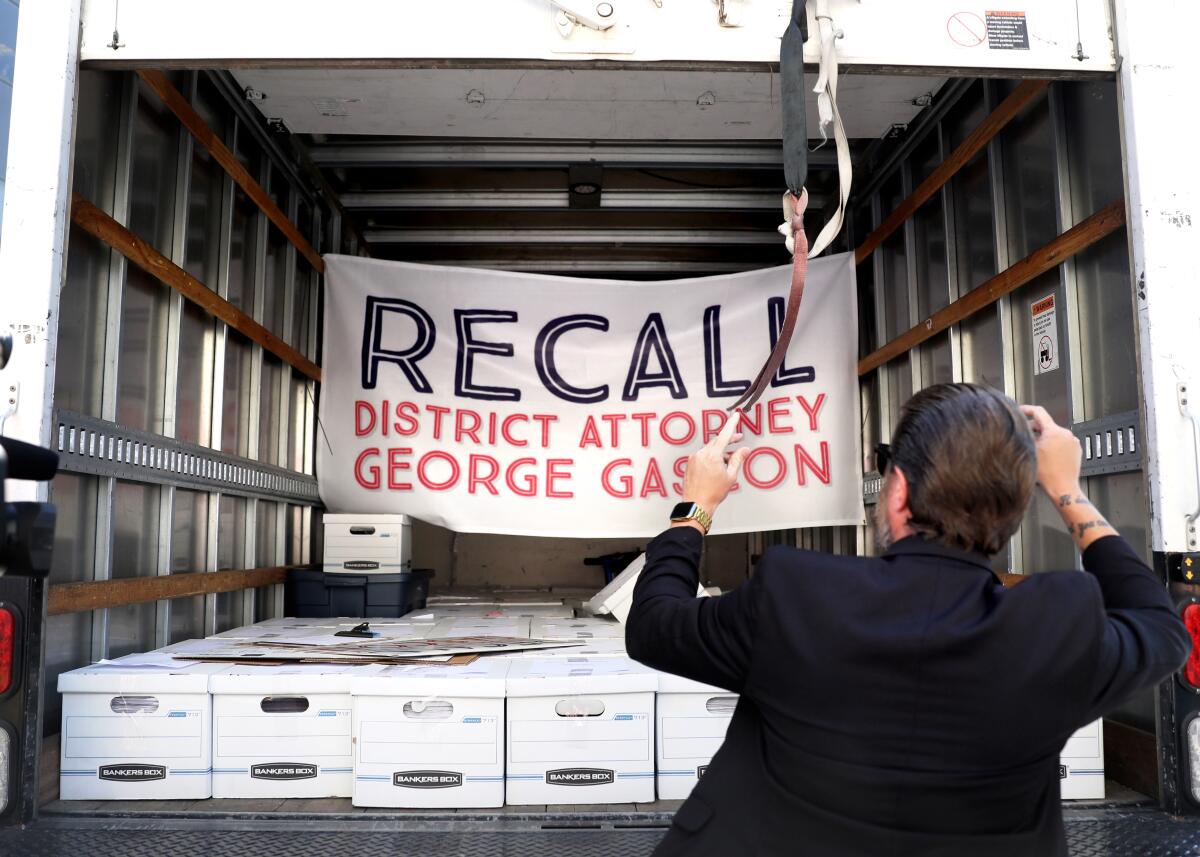Signatures of hundreds of dead people were found in D.A. Gascón recall petition

More than 300 signatures in a petition to recall Los Angeles County Dist. Atty. George Gascón last year belonged to dead people, according to the county’s Registrar-Recorder/County Clerk’s office.
Now the agency has called on the California attorney general to investigate the possibility of fraud in the failed attempt to recall Gascón, whose reform-minded policies have become a target of Republican and conservative critics.
According to the Registrar-Recorder/County Clerk’s office, a review of the petition found 367 signatures of people who had died before the recall effort was launched.
The findings were similar to a review of another petition, statewide Initiative 1935, in which county officials found 344 signatures of dead petitioners. The initiative was meant to limit local and state government from expanding, enacting or modifying taxes and fees.
“My office has identified irregularities that suggest the possibility of fraudulent signature submission that I believe warrant investigation,” Registrar-Recorder/County Clerk Dean Logan said in a statement.
The union for L.A. County deputy district attorneys has sued Dist. Atty. George Gascón, alleging his changes made prosecutors violate their oaths of office.
But the Recall District Attorney George Gascon campaign, which has accused the registrar’s office of wrongly invalidating tens of thousands of signatures, called the decision a “cover-up” to keep the campaign from reviewing the signatures that were invalidated by the county.
“This is nothing more than a last-ditch effort by Dean Logan to cover up the improper disqualification of thousands of valid signatures, which we ultimately intend to expose and challenge in court once the review is complete,” the campaign said in a statement. “To be clear, if paid circulator fraud did occur to any extent, the Recall Committee, survivors of crime, and residents of Los Angeles are the victims, and the paid circulators should be held fully accountable.”
In its review, the county office said it found “commonality in the circulators” of the petition campaigns to recall Gascon and the 1935 initiative.
Although such cases may be referred to the district attorney’s office for investigation, the registrar’s office referred the cases to the attorney general’s office because Gascón would be an “interested party” in the recall.
The registrar’s office has also reached out to the California secretary of state’s investigative unit.
A spokesperson for the office said it isn’t uncommon for some individuals to work to gather signatures for multiple organizations and campaigns.
The attorney general’s office did not immediately respond to requests for comment.
Elected in 2020, Gascón immediately faced criticism and an effort to remove him from office after he announced changes to the prosecutors office. His changes included ending the use of sentencing enhancements, limiting when defendants would be held in lieu of bail, and no longer seeking the death penalty in the county.
The changes put Gascón not just at odds with many of his own prosecutors and local law enforcement officials, but made him a target of Republican and conservative figures on the national stage who suggested that progressive, or derisively dubbed “woke,” prosecutors were to blame for increases in crime.
A first recall effort failed in 2021 largely because of a lack of fundraising and organization. A second effort failed last year after about 715,000 signatures were submitted by the recall campaign. A total of 566,857 signatures, or 10% of eligible voters, were needed to put Gascón’s job back on the ballot, but the registrar’s office said roughly 27% of the signatures submitted were not valid.
Most of them were found to have been duplicate signatures or from people who were not registered to vote.
The recall campaign followed by filing a suit against the registrar’s office, saying the many signatures were wrongly invalidated. The campaign has alleged in court that the office has not given it adequate access to review the recall petition and the invalidated signatures.
In a statement, the office said it was continuing to review the two petitions, as well as others that were submitted in the last year for more “possible irregularities.”
“The integrity of these processes is fundamental to our representative form of government and influences the confidence and participation of our electorate,” Logan said in the statement. “Attempts to compromise the integrity of this process ought to be scrutinized.”
More to Read
Sign up for Essential California
The most important California stories and recommendations in your inbox every morning.
You may occasionally receive promotional content from the Los Angeles Times.











